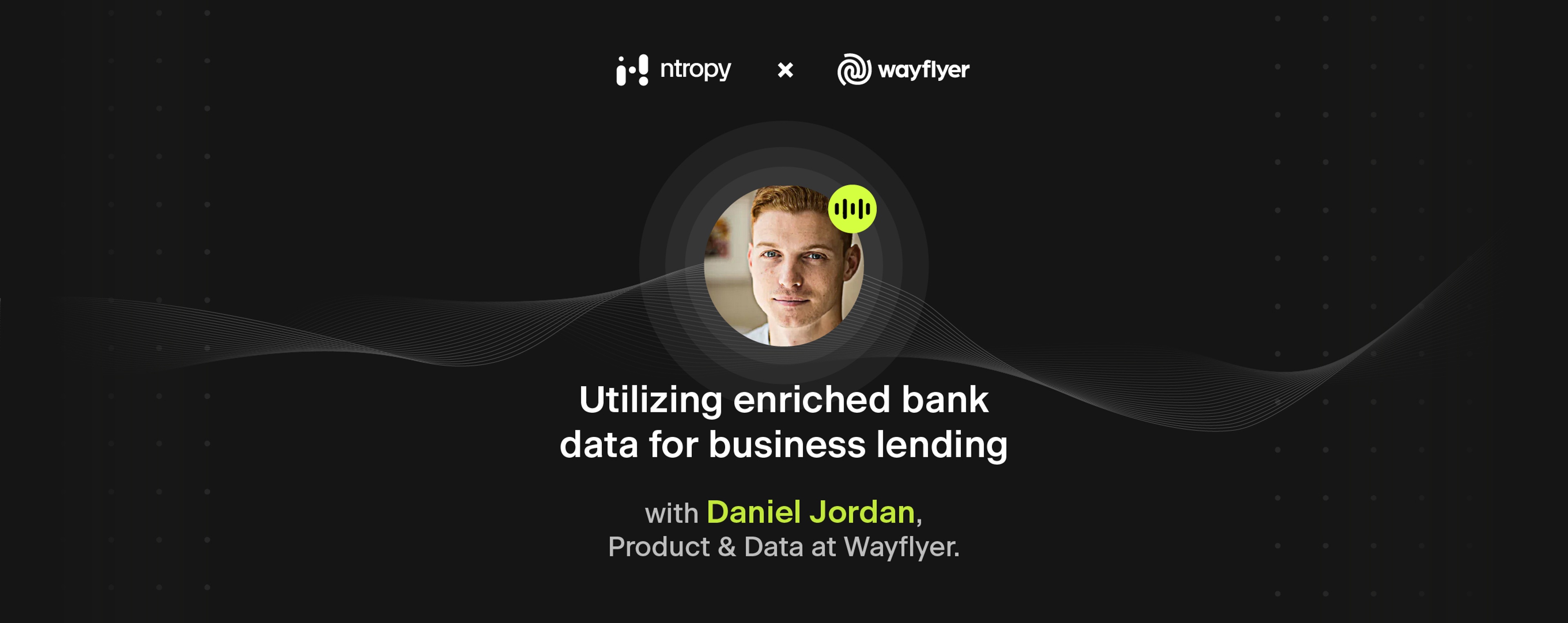Company, Underwriting, Podcast
12 Jan 2024
Podcast: Utilizing enriched bank data for business lending with Dan Jordan, Product & Data at Wayflyer

Author
Michael Jenkins
Product Marketing Lead
This podcast episode features Dan Jordan, Data Science Manager at e-commerce lender Wayflyer. Check out the summary and highlights below.
Highlights
Tell me about Wayflyer, what the company is and the product does.
Wayflyer is a fintech company where we primarily fund ecommerce businesses where there's a real need for working capital. So if you can imagine you sell fitness clothes and you place an order every month or two from a supplier. You have to pay for that inventory upfront. Then you might not sell it through your store for another month or two.That working capital is really tough for growing ecommerce businesses and growing retail businesses in general.
So what Wayflyer does is we fund that working capital, give customers what's called a merchant cash advance. So we advance money to them in return for future receivables. Future receivables means the money that they make from selling their inventory. What's really interesting about merchant cash advance is that the repayments are done on a proportion of your revenue. So if you were to sell $100 worth of goods today, and we were doing a 10% remittance, we would take $10, and you would keep $90.
What's nice about that is that your remittance or your payments back to us is proportional to how much business you're doing. If your business slows down, we'll take less. If your business speeds up, we're only taking 10%.
One of the nice aspects of the MCA is that it's a fee. So it's not an interest rate, which means that you can bake that fee directly into your margin.
How long have you been a customer of Ntropy? Give me a little bit of the story there and and where this comes to play into your platform.
I met Nare and Ilia nearly two years ago when they were just starting out and Wayflyer was about two years old.
Me and my team had been building the same technology internally, which was essentially transaction classification and the named entity recognition or entity extraction from banking transactions. Now, I thought I was good at my job as I'd built very similar sort of tech in United Health Group for medical charts and I thought I knew what I was doing.
When I met Ilia and he talked me through what they were doing and how they were doing it and I realized that they were blowing past us and even the quality of the data that they were getting. They're getting it from many more sources than we were and then the features that they're adding to their products. Eventually, I realized that there was no point in us trying to do it ourselves anymore. And we migrated over to Ntropy last year.
Generative AI and LLMs are the talk of the town right now. Like they are the hype that's in the headlines. Are you using any of these approaches within Wayflyer? Are you seeing any use for your offering? And if so, how?
Yes, in some ways, yes. Now, we're not trying to develop some sort of product similar to chat GPT. We're not thinking about how we can use use LLMs as a product offering. But what we do use is LLMs internally as you know, we we consume the output of them.
Ntropy's model is an LLM and we use that for every single customer, every single transaction that we consume. Ntropy gives us this very rich, structured data to build other processes on particular underwriting process.
This is a big benefit for LLMs within the finance industry, in my opinion, turning unstructured data into structured data. So you put them into processes where you are either using them for risk assessment, or using them for general application, like processing. Transactions from Ntropy is one example.
We're doing stuff with customer products. We get access to all of the product descriptions, titles and images from our customers and we can use LLMs to predict what industry this customer is in and then we can use that industry to do customize how that customer engages with us, maybe through our outbound.
I think what we're going to start to see similar use cases with accounting data. When we get accounting data, a line item within an account is called a general ledger so we use that to predict what general ledger that account should go under or what kind of accounting line it should go under so that we can use that within our analytics for analyzing the business performance of our customers. That's really for us, that's the key.
When I mentioned unstructured data to structured data, the alternative is people manually doing this work.
So with Wayflyer and with your customers how do you prioritize what is important?
I'm coming from the backend of Wayflyer and mostly around our technology for underwriting, for risk management and risk modeling. When we think about our customers and then what we prioritize for our customers, then what we prioritize internally, our big focus, if we can do things really efficiently, we can service more customers.
If Wayflyer has a certain amount of deals we can do in a month because of the capacity that we have, we then have to decide, okay, let's focus on this section of e-commerce. Let's focus on these types of customers, these sides of customers. The way we prioritize internally is the way I think about it.
What I think about is how do we make the process as efficient as possible from the backend, how do we make sure that we fall within any of our risk thresholds so that we can fund as many e-commerce stores as possible. So what I'm mainly focusing on for our roadmap is things like data integrations, integrations of things like Ntropy, our internal process for turning all of that data into analytics and dashboards, monitoring of customers, any of the technologies that we need so that we can scale Wayflyer to the point that we'd fund a million customers.
What is the real impact of AI going to be on finance?
It's going to turn the thing upside down, I think. Finance is typically dominated by the big players. The big banks across all of the countries have been around for a very long time. They're gigantic businesses, but they don't innovate. They're massively robust, but they stall in terms of innovation and offerings.
The way I see it is AI and software in general is going to enable people to start targeting specific products, specific niches, and take on the incumbents in a way that will probably be fairly radical. I think mostly it's about competition. It's about customers being able to come up with new services and offerings that they can turn into businesses quickly.
The competitive edge that we can gain by using a provider like Ntropy is huge. It'd take a very long time for banks, if ever, to be able to graduate their processes internally to use something like an LLM to enrich their transactions or to do even more.

